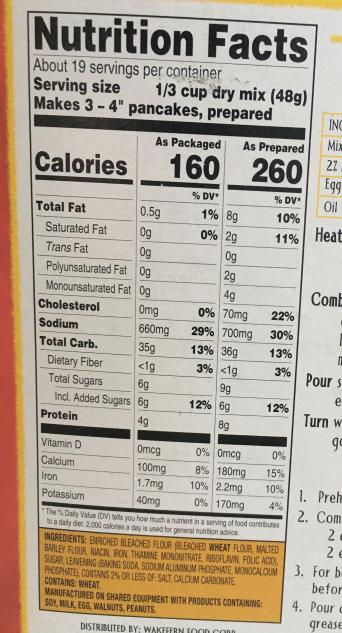
A Deep Dive into Nutrition Labels and Choosing Which Foods to Buy

Editor’s Note: This article gives a basic overview of nutrition facts; it should not be confused with medical advice. Before making any big changes to your daily diet, please consult a nutritionist or medical professional.
Whether it’s our daily meals or snacks, what we choose to eat affects our body’s health and well-being. With the pandemic requiring us to shop efficiently for the benefit of everyone, how do you decide which foods to bring home (or have delivered)? In these days of staying at home it is even more important to know what you are feeding your family or yourself to stay healthy.
Here’s a guide to deciphering the food labels found on most packaged products.
The Building Blocks of Food
Food is made up of three basic nutrients your body needs and cannot produce itself:
- Fats provide energy, support cell growth, protect organs, help keep the body warm, and assist in absorbing nutrients and producing important hormones. They are found in meat, fish, oil, butter and cheese.
- Carbohydrates are the main source of energy for the body. They are composed of sugar and fiber. Sugar molecules link together to form starches and fiber, which then break down into glucose. Naturally occurring sugars are found in fruit (fructose) and in milk (lactose), as well as white and brown sugar and honey.
- Protein makes up hair, blood, connective tissue, antibodies, enzymes and more. It comes from meat as well as in plant sources, including beans, lentils, split peas and black-eyed peas.
THE NUTRITION LABEL
Nutrition labels give you lots of information. We have defined some terms and added information to help you understand them.
Calories are a measurement to help manage your weight (lose, gain or maintain). The key is to balance how many calories you eat with how many your body uses.
Saturated fats are solid at room temperature (butter, for example). The American Heart Association recommends replacing saturated fats with unsaturated fats. In a 2,000-calorie-per-day diet, only 5%-6% of calories, or 13 grams, should come from saturated fats.
Trans fats occur mostly in some baked goods, fast food, some snacks, some pre-prepared foods (think cookie dough, ready-made frosting, pie crusts), and vegetable shortening.
Cholesterol is a component of blood that affects heart health. There are two types: low-density lipoproteins (LDLs) and high-density lipoproteins (HDLs). It’s best to try to reduce your LDLs, which take cholesterol to your arteries, and increase your HDLs, which transport cholesterol to your liver to be expelled from your body.
According to the Harvard Health website, you can lower your LDL cholesterol level by reducing trans fats and saturated fats, eating more fruits and vegetables, and avoiding refined sugars and grains. To up your HDL level, healthline.com recommends switching to olive oil in salad dressings, sauces and lower-temperature cooking, and incorporating beans, legumes, whole grains, high-fiber fruit and fatty fish into your diet.
Sodium Americans tend to consume too much, mostly from eating packaged and prepared foods. The recommended daily amount is less than 2,300 milligrams per day, according to the Food and Drug Administration.
Dietary Fiber is mostly found in vegetables, fruits, whole grains and legumes. The recommended daily amount for adults is 25 to 30 grams a day from food, not supplements, according to the American Heart Association Eating Plan. Most Americans get about half of that per day.
Total Sugars should be consumed sparingly, if at all. The AHA suggests an added sugar limit of no more than 100 calories a day for most women and 150 calories a day for most men.
Protein is necessary for many growth processes; it can be found in meat and plant sources. The recommended daily amount is .8 grams per kilograms of an individual’s body weight.
The following nutrients may improve individual health and reduce the risk of some diseases and conditions:
Vitamin D Found in some foods; added to almost all processed dairy milk and some orange juice. It’s needed to absorb calcium and promote bone growth.
Calcium One of the most important minerals for the body. Helps form and maintain healthy teeth and bones.
Iron Helps red blood cells transport oxygen; plays a role in energy levels in the body.
Potassium An important mineral that regulates fluid balance, muscle contractions and nerve systems.
Dvora Konstant is a writer/editor who translates scientific into English. She has kept kosher, been a vegetarian, and has diabetes as well as a genetic disease involving copper absorption. She and her husband have fed two children, one of whom is a vegetarian, and both of whom are now grown (so we must have gotten it right).
